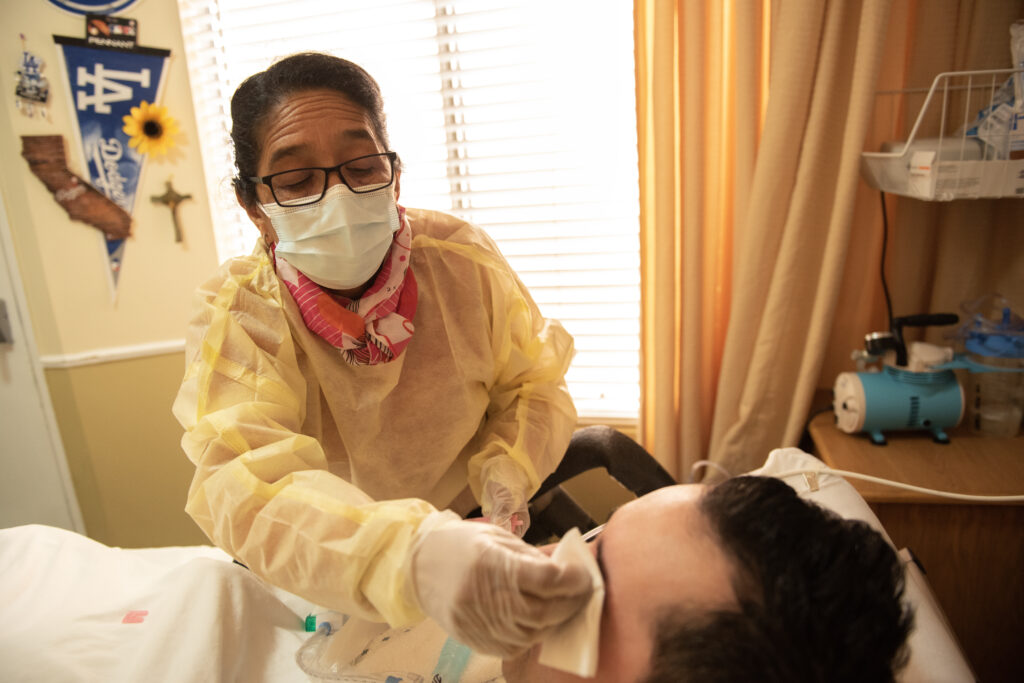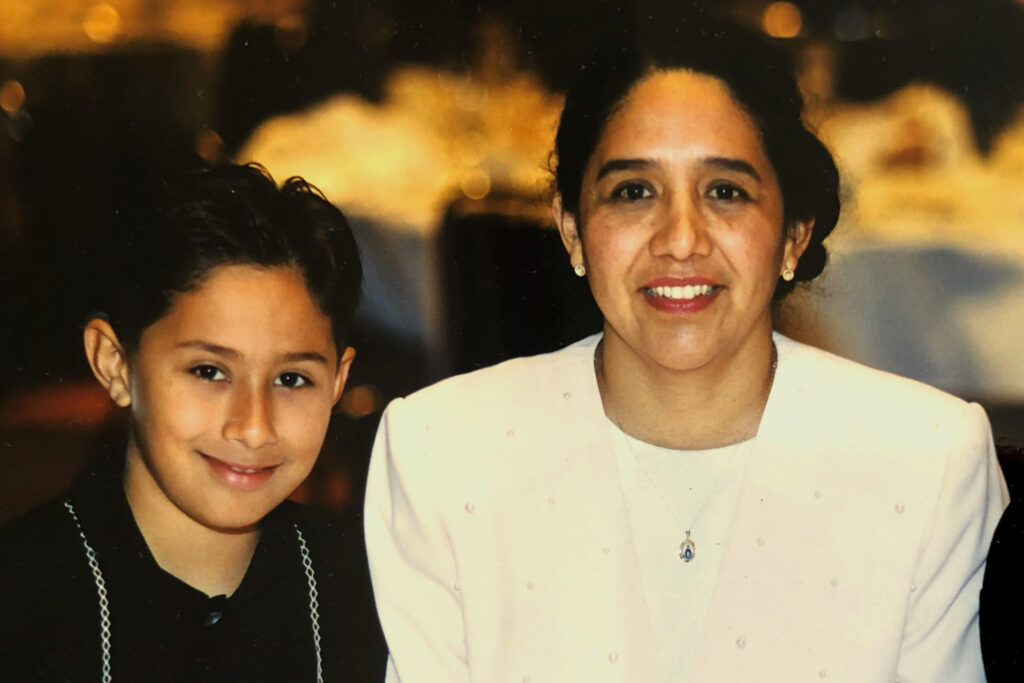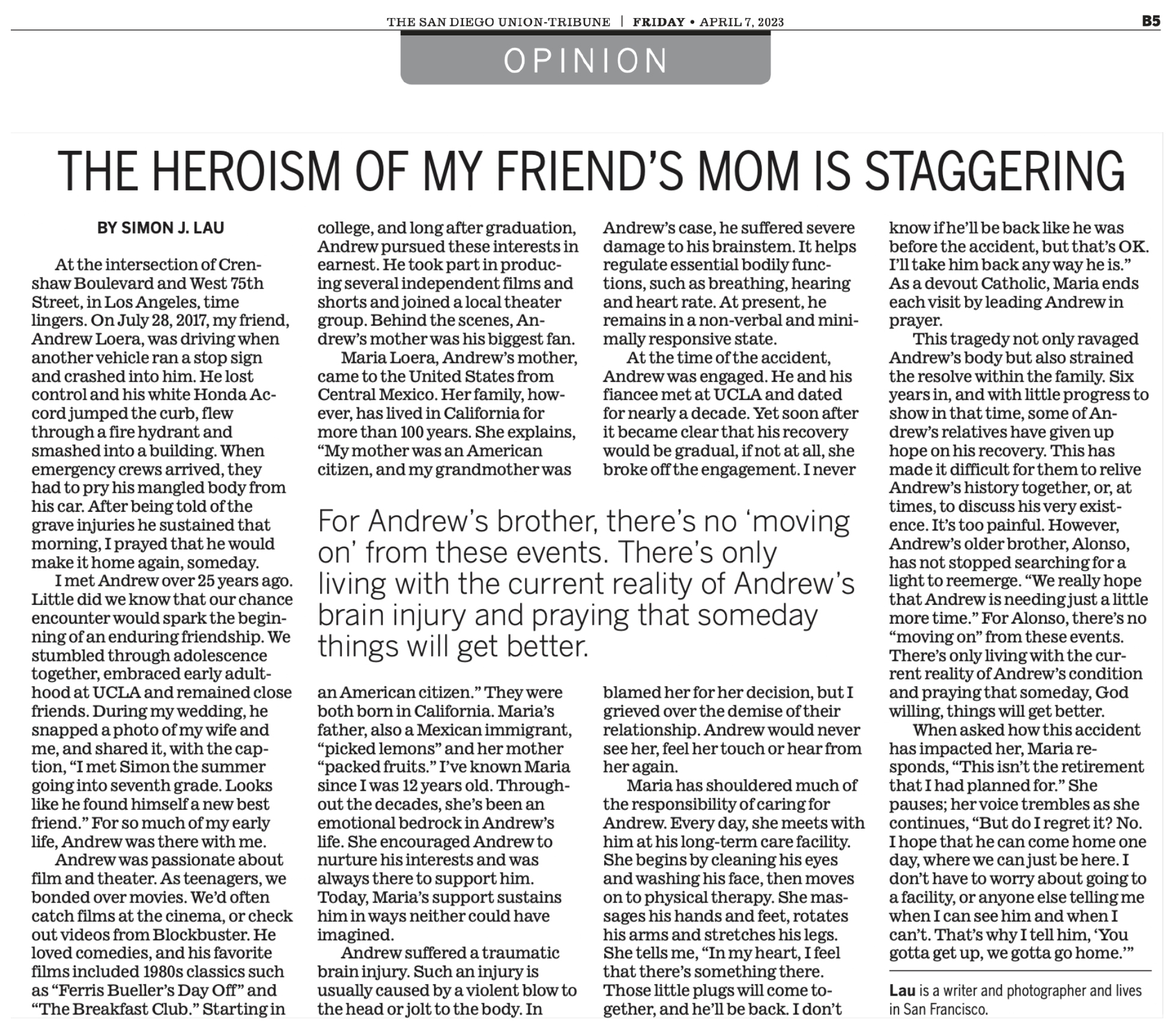April 7, 2023
The San Diego Union-Tribune
The heroism of my friend's mom is stagger

By Simon J. Lau
At the intersection of Crenshaw Boulevard and West 75th Street, in Los Angeles, time lingers. On July 28, 2017, my friend, Andrew Loera, was driving when another vehicle ran a stop sign and crashed into him. He lost control and his white Honda Accord jumped the curb, flew through a fire hydrant and smashed into a building. When emergency crews arrived, they had to pry his mangled body from his car. After being told of the grave injuries he sustained that morning, I prayed that he would make it home again, someday.
I met Andrew over 25 years ago. Little did we know that our chance encounter would spark the beginning of an enduring friendship. We stumbled through adolescence together, embraced early adulthood at UCLA and remained close friends. During my wedding, he snapped a photo of my wife and me, and shared it, with the caption, “I met Simon the summer going into seventh grade. Looks like he found himself a new best friend.” For so much of my early life, Andrew was there with me.
Andrew was passionate about film and theater. As teenagers, we bonded over movies. We’d often catch films at the cinema, or check out videos from Blockbuster. He loved comedies, and his favorite films included 1980s classics such as “Ferris Bueller’s Day Off” and “The Breakfast Club.” Starting in college, and long after graduation, Andrew pursued these interests in earnest. He took part in producing several independent films and shorts and joined a local theater group. Behind the scenes, Andrew’s mother was his biggest fan.

Maria Loera, Andrew’s mother, came to the United States from Central Mexico. Her family, however, has lived in California for more than 100 years. She explains, “My mother was an American citizen, and my grandmother was an American citizen.” They were both born in California. Maria’s father, also a Mexican immigrant, “picked lemons” and her mother “packed fruits.” I’ve known Maria since I was 12 years old. Throughout the decades, she’s been an emotional bedrock in Andrew’s life. She encouraged Andrew to nurture his interests and was always there to support him. Today, Maria’s support sustains him in ways neither could have imagined.
Andrew suffered a traumatic brain injury. Such an injury is usually caused by a violent blow to the head or jolt to the body. In Andrew’s case, he suffered severe damage to his brainstem. It helps regulate essential bodily functions, such as breathing, hearing and heart rate. At present, he remains in a non-verbal and minimally responsive state.
At the time of the accident, Andrew was engaged. He and his fiancee met at UCLA and dated for nearly a decade. Yet soon after it became clear that his recovery would be gradual, if not at all, she broke off the engagement. I never blamed her for her decision, but I grieved over the demise of their relationship. Andrew would never see her, feel her touch or hear from her again.
Maria has shouldered much of the responsibility of caring for Andrew. Every day, she meets with him at his long-term care facility. She begins by cleaning his eyes and washing his face, then moves on to physical therapy. She massages his hands and feet, rotates his arms and stretches his legs. She tells me, “In my heart, I feel that there’s something there. Those little plugs will come together, and he’ll be back. I don’t know if he’ll be back like he was before the accident, but that’s OK. I’ll take him back any way he is.” As a devout Catholic, Maria ends each visit by leading Andrew in prayer.
This tragedy not only ravaged Andrew’s body but also strained the resolve within the family. Six years in, and with little progress to show in that time, some of Andrew’s relatives have given up hope on his recovery. This has made it difficult for them to relive Andrew’s history together, or, at times, to discuss his very existence. It’s too painful. However, Andrew’s older brother, Alonso, has not stopped searching for a light to reemerge. “We really hope that Andrew is needing just a little more time.” For Alonso, there’s no “moving on” from these events. There’s only living with the current reality of Andrew’s condition and praying that someday, God willing, things will get better.
When asked how this accident has impacted her, Maria responds, “This isn’t the retirement that I had planned for.” She pauses; her voice trembles as she continues, “But do I regret it? No. I hope that he can come home one day, where we can just be here. I don’t have to worry about going to a facility, or anyone else telling me when I can see him and when I can’t. That’s why I tell him, ‘You gotta get up, we gotta go home.’”




